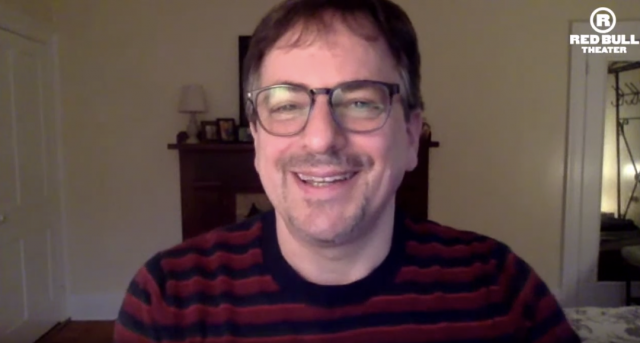
Founding artistic director Jesse Berger introduces one of Red Bull’s livestreamed readings during the pandemic (screenshot by twi-ny/mdr)
Red Bull Theater
Galathea: Monday, March 15, free (suggested donation $25), 7:30 (available on demand through March 19)
Galatea: Monday, March 22, free (suggested donation $25), 7:30 (available on demand through March 26)
Paradise Lost: Monday, April 12 & 26, free (suggested donation $25), 7:30
www.redbulltheater.com
A year ago yesterday, New York City closed all entertainment venues, leading to endlessly sad postponements and cancellations that no one thought would last as long as it has. Theater companies were forced to examine their immediate and long-term futures: Some went into hiatus, others came up with intermittent virtual offerings, and a handful went all in, quickly developing an online streaming presence through readings, conversations, and innovative interactive live programming. One of the busiest, and most successful, has been Red Bull Theater. Founded in 2003 by artistic director Jesse Berger, Red Bull specializes in splendidly designed and costumed Jacobean works (Ben Jonson’s Volpone, John Ford’s ’Tis Pity She’s a Whore, Richard Brinsley Sheridan’s The School for Scandal) in addition to inventive contemporary adaptations (Erica Schmidt’s Mac Beth set in a girls school, Berger’s take on Gogol’s The Government Inspector, starring Michael Urie). Over its history, the troupe has also hosted more than two hundred Revelation Readings with all-star casts in various theaters, and it sponsors the Shakespeare in Schools initiative to bring the Bard to young students.
Red Bull’s virtual season kicked off in April with the first-ever “RemarkaBULL Podversation,” with Urie delivering Mercutio’s “Queen Mab” speech from Romeo and Juliet, followed by a discussion with Red Bull associate artistic director Nathan Winkelstein; subsequent Podversations have featured Chukwudi Iwuji performing “A Homely Swain” from Henry VI,
Elizabeth Marvel doing “Cry Havoc” from Julius Caesar, and the phenomenal Patrick Page delving deep into Othello in “Exploring Iago.” All Podversations are available for free on YouTube, but the dozen live Zoom readings the company has streamed, from Berger’s new version of Thomas Middleton’s The Revenger’s Tragedy to Anchuli Felicia King’s modern-day Keene and Frances Burney’s The Woman Hater directed by Everett Quinton, remain online for only four days after the initial livestream. Each reading is accompanied by still-available Bull Session panels with Winkelstein and members of the cast and crew. Up next is a two-parter, John Lyly’s 1588 queer love story, Gallathea, on March 15, in collaboration with the Drama League, and MJ Kaufman’s new Galatea, on March 22, a trans love story in collaboration with WP Theater. Red Bull held its tenth annual Short New Play Festival in July, a fun virtual evening with works by Jeremy O. Harris, Theresa Rebeck, and others, with casts that included Kathleen Chalfant, Lilli Cooper, Edmund Donovan, William Jackson Harper, and Charlayne Woodard; the eleventh annual event, the theme of which is restoration, is scheduled for July 12.
A native Oregonian who was previously the assistant director of the Shakespeare Theatre Company in Washington, DC, Berger took time out of his ridiculously busy schedule to talk about Red Bull, the pandemic, and the future of theater.

Jesse Berger is front and center at a Red Bull Zoom reading (photo courtesy Red Bull Theater)
twi-ny: Red Bull has been one of the most active theaters in the country during the pandemic, going back to April. How and when was it decided to proceed full steam ahead with reunion readings and conversations?
jesse berger: It’s been almost exactly a year since the shutdown, and I think all of us went through the stages of grief at different paces — shock, denial, etc. — and out of that confoundingly confusing time and in consultation and through conversations with our wonderful team — led by our great managing director Jim Bredeson, wonderful board, terrific staff, extraordinary artistic associates, and other supporters — came the hunger for us to do something, anything, to connect our community. So . . . the original impetus was really just — get something out there that is our work that gets artists and audiences together, even if only virtually.
Just two weeks after lockdown began, on March 26, we announced the first of what has become a robust series of online activities. Since then it has simply been a learning experience that has led us to do more. For the first six months, we really just tried different ways to improve and experiment with the online experiences we were concocting. As it began to sink in over the summer that this shutdown was likely going to take a year or more, we made the decision to proceed with planning a fully virtual season for 2020–21. We probably hit our stride on these activities around October and have of course kept looking for ways to improve and innovate throughout.
twi-ny: The economic toll on theater companies has been devastating. Have these programs been financially viable for you?
jb: It has been devastating, indeed, and we count ourselves among the lucky ones because we were relatively financially healthy and relatively unencumbered when the shutdown hit. We made the decision to offer all our activities for free or pay what you can, and of course to compensate participating artists as much as we possibly can. We have found that audiences have by and large been generous in responding to this work and this method, so the programs are at minimum paying for themselves / breaking even through many small donations of $25, $10, $50. . . . Then we have hugely relied upon the larger generosity of larger donors, major institutional supporters, government support like PPP, and other foundation grants to keep the lights on and the staff fully employed. We’re grateful for the fact that we have not had to lay anyone off or furlough.
twi-ny: Red Bull has been streaming presentations several Monday nights every month going back to nearly the beginning of the lockdown, while other theaters have either been silent or put on occasional readings or talks, but not necessarily both. What’s the process like, especially gathering everyone together for the reunions, rehearsing over Zoom, and working at such a furious pace?
jb: We have a wonderful staff of four, and I appreciate you recognizing the quantity as well as the quality of the overall work output from Red Bull in this time! All I can say is that everyone is working hard, but I think it’s fair to say that no one feels particularly overwhelmed or overtaxed. We’ve simply done our best to be efficient and strategic with our efforts and our plans. As far as gathering the artists and that process, it’s not that different from the before-times — we reach out with offers to agents and/or directly to the participating artists, we make a schedule, we stick to it. The new stuff is the preplanning around what if anything needs to be sent to the actors for them to do their best work — greenscreens, microphones, internet help, lighting, etc. Nathan also schedules one-on-one tech sessions to check in with every participant so they have what they need before rehearsals start.
twi-ny: Red Bull’s bread and butter is Jacobean theater, which seems to be very relevant to what is happening today. Why do you think that is?
jb: Well, while I believe in social progress and that many things are probably better for humanity now than they were four hundred years ago, I’m also totally convinced that human beings and human relationships weren’t that different four hundred years ago. If anything, this most recent plague has brought home how similar our times are, even if the circumstances in which we live are more civilized — and thankfully we have amazing scientists making vaccines in record time. Also, I think that the Jacobeans in particular feel pretty contemporary in their outlook. These plays can be powerfully used to reflect our current society’s hypocrisies and inequities as well as its greatest hopes and aspirations.
twi-ny: In October, the amazing Patrick Page gave a master class on Iago as part of the company’s “Othello 2020” project. Have you seen his one-man show for Shakespeare Theatre Company, All the Devils Are Here? Have you watched much theater during the pandemic, and if so, has anything stuck out for you?
jb: Patrick Page is amazing, isn’t he? He’s one of the best Shakespearean actors in America, and beyond. We actually were privileged to share the New York premiere of All the Devils Are Here as a one-night benefit performance last February to a packed house at the Cherry Lane, so I know it well.
Patrick and I go way back — we both hail from an Oregon background, and we actually met when we were both working at the Utah Shakespeare Festival a number of years ago. It’s been a great experience to reconnect with him at Red Bull in NYC over the past years — he starred in our productions of The Duchess of Malfi and Coriolanus and has taught a number of acting intensives for us. He was also our 2010 Matador Award for Excellence in Classical Theater recipient. He’s great. I can’t wait to work with him again. And All the Devils Are Here on film is well worth your time, as well as Patrick’s excellent PODversation with Nathan on Iago.
I was voraciously consuming online theater in the earlier days of the pandemic, but I will admit to watching a bit less over time. Part of the reason is personal and part professional. I have two young kids at home, so finding additional time to watch things on the screen beyond keeping up with everything we are doing at Red Bull is hard. However, I loved Richard Nelson’s What Do We Need to Talk About?, Michael Urie’s Buyer & Cellar, TFANA’s Mad Forest, Jefferson Mays’s Scrooge, and Bill Irwin and Christopher Fitzgerald’s Old Globe comedy routine.
twi-ny: Do you and Nathan ever sleep?
jb: I can’t speak for Nathan, but thanks to the aforementioned wonderful two young kids at home, no — I never sleep. And yes, Red Bull’s online activity has certainly kept us a bit sleep deprived.
twi-ny: Do you have a wish list of plays you’d like to do as readings or of actors you’d like to work with online?
jb: Yes, but it’s top secret!

Jesse Berger has been a busy man during the coronavirus lockdown (photo courtesy Red Bull Theater)
twi-ny: Companies are now starting to film plays on their stage, selecting works that feature very small casts, often only one or two actors. Red Bull specializes in plays with many characters. Are there any plans to film anything onstage? How will cast size affect what plays you do once we come out of this?
jb: With the work we do, large cast sizes are often de rigueur and can make for difficult decisions when it comes to our budget. However, we have also produced plays such as Erica Schmidt’s seven-actor Mac Beth, Keith Hamilton Cobb’s two-actor American Moor, as well as Jean Genet’s The Maids, plus a ten-actor (is that small?) Coriolanus directed by Michael Sexton. As we begin to get clear guidance from the authorities and the unions that represent the artists with whom we work, we will be better situated to make decisions about if we might have to do some smaller cast plays simply as a safety necessity. And we are certainly keeping our eye on and out for some great material that will suit that bill.
twi-ny: Once theaters are back open and audiences are allowed inside, what do you think is the future of virtual productions? Do you see hybrid works continuing, or do you think online shows and readings will phase out?
jb: At the moment, I think the genie is out of the bottle, and online readings will likely continue. I suspect they will continue to be part of many theaters’ ancillary programming. I know they will be part of our future as they enable us to reach audiences worldwide with the work that is central to our mission. Of course our heart and soul will still be in the live theater experience.
twi-ny: What has sheltering in place been like for you on a personal level? Have you remained in New York City the whole time or been able to travel to see family?
jb: We were relatively lucky to be out of NYC for the first six months of the shutdown and have also been grateful to be able to be back in NYC since September. Sadly we have not yet been able to see our extended family who live all over the country, although we are Zooming with them a lot. Now that vaccines are rolling out, we are looking forward to making some plans to see everyone again in person.
twi-ny: Once you’re fully vaccinated, what’s the first thing you’re going to do that you have not been able to do since last March?
jb: So many things to do! But . . . it’s still a bit complicated, isn’t it?